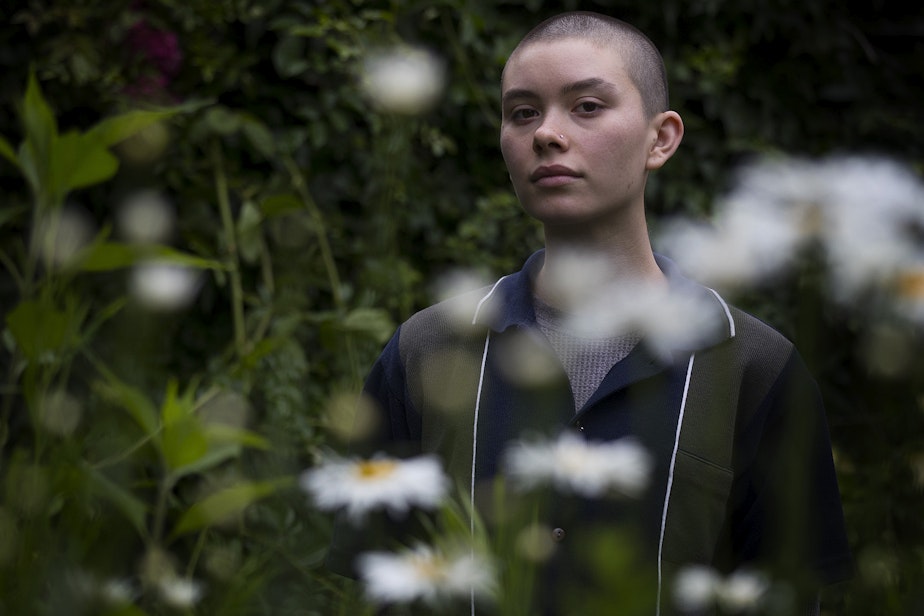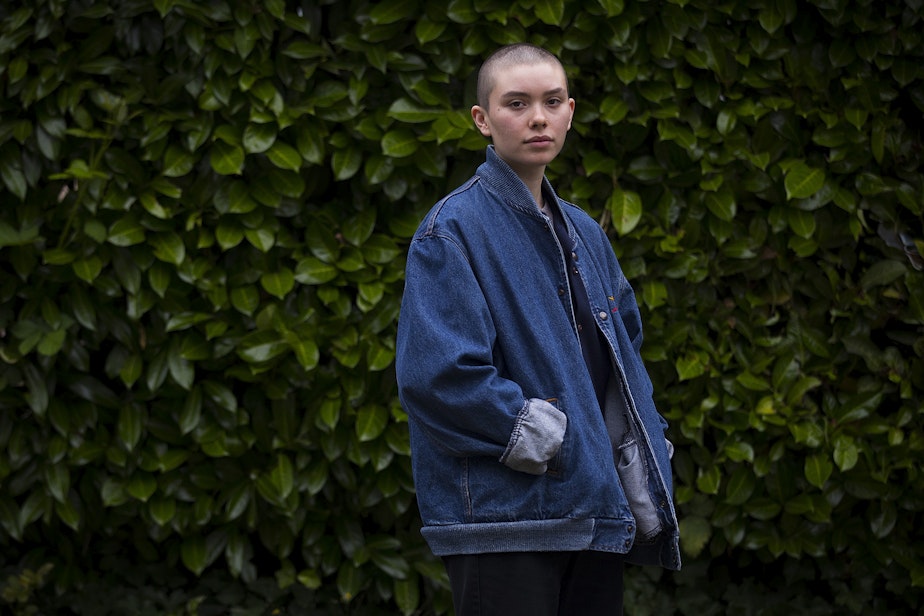This street medic was arrested during a Seattle protest, then jailed in isolation because he's transgender

Joaquin Uribe, a volunteer medic during the Seattle protests for racial justice, was accused of assaulting a police officer during a protest and was arrested. He then spent most of the 46 hours he was in jail in isolation because he is transgender.
Uribe refutes the officer's allegation, and says it was the arresting officer who left him with multiple injuries, including a puncture wound in his abdomen.
Joaquin Uribe opted to take the day off from his job at a grocery store on Sunday, May 31, and instead attended a demonstration in downtown Seattle. That weekend marked the start of ongoing protests against racism and police violence in the Seattle area.
"I didn't think that I had any other choice. You know, I guess for my morals," he told KUOW.
Uribe, 19, recently graduated from a nursing program, and also saw an opportunity to put his medical knowledge to use during the May 31 demonstration.
Seattle police officers had used tear gas and pepper spray against protesters during a demonstration downtown, at Westlake, the day before. Uribe, who had been there on Saturday, anticipated it could happen again on Sunday — and it did.
Police deployed tear gas and flashbang grenades, causing a haze to form around the area near Fourth Avenue and Seneca Street, where Uribe stood.
Sponsored
"People were chanting, there were smiles — it was really nice," he said. "And then suddenly, it got crazy really fast ... there was ringing in my ears and I couldn't really see because of the smoke."
That was around 4:30 p.m. Seattle Mayor Jenny Durkan had instituted a 5 p.m. citywide curfew that day, in the wake of the previous night's unrest.
In the midst of the chaos, Uribe encountered a woman who was crouched down and holding her face in her hands. He had with him a water bottle containing liquid antacid and water, a solution commonly used to flush the eyes of people exposed to chemical irritants.
"I was like, 'Okay, lean your head back. I'm going to grab the back of your head, and I'm going to pour this over your eyes, okay? It'll help with the burning'," he recalled saying.
Moments later, a line of cops on bicycles emerged and advanced toward protesters. Uribe said one of the officers hit him with his bike, startling him. The impact of the collision, Uribe said, caused the open bottle of liquid antacid and water in his hand to splash into the officer's face.
Sponsored
"The next thing I remember is, I'm on the ground on top of his bike," he said. "And he's on top of me and both of our body weight is pushing me into his bike. And his bike pedal actually made a puncture wound in my in my abdomen."
READ: Protesters injured by Seattle Police in demonstrations for racial justice
Uribe stands at 5 feet and 5 inches tall, and weighs 120 pounds. He estimates that the officer in question was roughly 6 feet tall.
Solitary confinement
Uribe was arrested, taken to Harborview Medical Center for his injuries, and ultimately jailed in solitary confinement for nearly two days, pending the investigation of an alleged assault against the officer.
Sponsored
A police report states that Uribe failed to comply with a legal order to move and "then threw a full can at a uniformed officer."
Uribe and his attorney, Talitha Hazelton, maintain that no such order was given and deny the allegations that he assaulted an officer. Hazelton described the arrest as "baseless."
The arresting officer also indicated in the report that they "object to [Uribe's] release," citing the alleged assault. The criteria for such a recommendation, as outlined in the Seattle Police Department's detainee booking manual, points to such an action being reserved for offenders considered to be dangerous, a flight risk, or a repeat offender.
Uribe has no prior criminal history. The police report does not mention any injuries sustained by the officer in question, nor does it reference Uribe's injuries.
Sponsored
READ: He captured footage of a child pepper sprayed during a Seattle protest. Then he was arrested
The Seattle Police Department has not responded to multiple requests for comment on Uribe's arrest.
Upon being booked at the King County Correctional Facility, Uribe, who is a transgender man, was asked whether he would prefer to be housed with male or female inmates.
"I was like, 'Probably the females.' I'd probably be safer there because obviously I don't, like, fully pass as a man," he said, adding that he is often perceived to be both a man and a woman by strangers.
Uribe said his understanding was that he would be placed among the female general population at the jail. But he realized that wouldn't be the case when someone slipped a notice under the door of his holding cell.
"I look at it, and it's saying that I'm going to be put in isolation because I said I'm trans," he said.
Sponsored
The same document states that Uribe would remain in administrative segregation, pending a review of his status by the jail's Transgender Review Committee — an action that can take up to 72 hours, excluding weekends and holidays.
"I couldn't sleep the whole first night in isolation, and I just kind of like cried," Uribe said. "I think I had a couple panic attacks."
A spokesperson for the King County Department of Adult and Juvenile Detention suggested it is standard procedure for transgender inmates to be temporarily placed in restrictive housing upon being booked.
Hazelton, Uribe's attorney, said jail staff did not explicitly communicate to her client that his placement in isolation was based on concerns for his safety.
Uribe said he lost his sense of time while in solitary confinement, and was only occasionally informed of the hour by jail staff. He was allowed out for one hour each day, and to meet with Hazelton.
"Anytime anybody would walk by, I would have to bang on the door and yell through the door, 'What time is it?' Or like, 'Can you tell me what time it is?' I just never really knew what time it was, and it was really, really scary."
The night of his arrest, Uribe's boyfriend, M Aguilar, had spent roughly three hours not knowing what happened to his partner. And while Uribe was in jail, Aguilar coordinated getting him legal counsel.
Aguilar said the experience also brought about anxiety for him, as he worried about what would become of Uribe in jail.
"He was just telling me that he was in isolation for being trans and that freaked me out," Aguilar said. "That made me feel like he was in danger and like, they weren't treating him with respect, you know? That phone call was the scariest day of my life."
Uribe said he also had issues with getting the pain meds that had been prescribed to him for his injuries in a timely fashion. Then there was confusion over a court appearance, which he said wasn't clarified to him until after he'd had another panic attack.
"Nobody answered my intercom [calls] the whole entire time that I was calling about this," Uribe said.
He said he also worried about contracting Covid-19, considering he noticed several guards not wearing masks at his booking.

Uribe's release
Uribe was released from the King County Jail without bail on June 2, approximately 46 hours after he was booked. As of Thursday afternoon, no charges have been filed against Uribe.
However, the Seattle Police Department has referred the charge of felony assault against Uribe to the King County Prosecutor Dan Satterberg's office. A spokesperson for the office said documents submitted by police surrounding Uribe's case were still under review.
If county prosecutors decline to pursue felony charges, the case could be knocked down to a misdemeanor and taken on by city prosecutors.
Seattle City Attorney Pete Holmes said in a statement on June 17 that he did not intend to bring criminal charges against peaceful demonstrators.
However, Hazelton has argued that this provides little reassurance that city prosecutors won't change their posture and file charges down the road.
"SPD, under color of law, is detaining and charging protesters unilaterally with crimes where SPD names themselves the victims," Hazelton wrote in a June 22 letter addressed to Satterberg and Holmes.
She also rejected Holmes' offering to allow people ages 18 to 24 to participate in a diversion program, as an alternative to being criminally charged.
"One of my clients languished after a trip to Harborview due to injuries they sustained at the hands of SPD. And you want them to earn the dismissal of their charges?" Hazelton wrote.
The uncertainty surrounding his arrest has left Uribe worried about the impact it might have on his plans to move to New York City later this summer and continue his nursing education — especially if demonstrations against racism and police brutality are still happening.
"I want to try and do something when I'm there," he said. "But it's like I can't really do much, because I can't get arrested again ... I can't get in trouble with the law again."
The ordeal of being arrested also forced Uribe to come out to his parents about his transgender identity earlier than he had planned. They flew into Seattle, to his surprise, to greet him upon his release from jail.
"They've been very supportive. And they were really, really helpful," he said.
Uribe said that being released from jail and reunited with his loved ones felt like waking up from a terrible dream.
"In the jail, I had a really, really tiny window and I didn't really get any light through it," he said. "And so just being outside in fresh air and you know, light — I felt like I could breathe."

